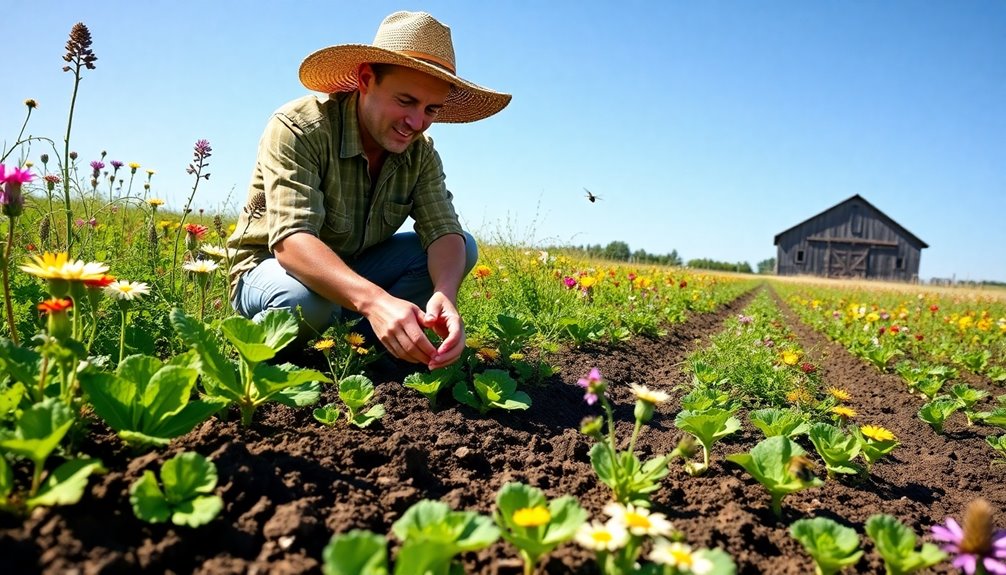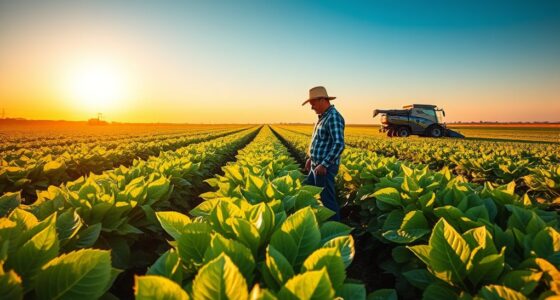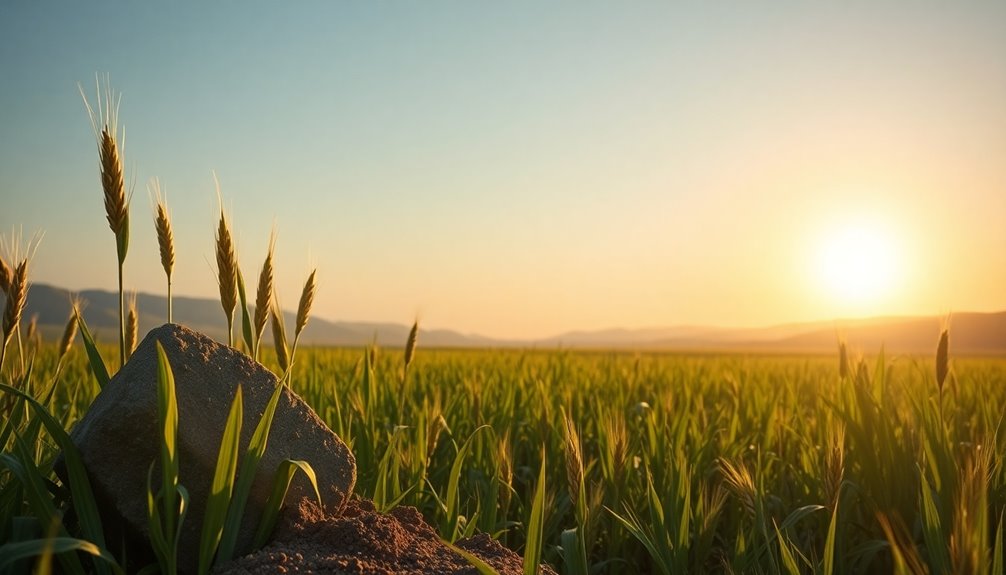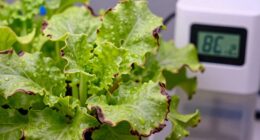Organic farming focuses on using natural methods to grow food while avoiding synthetic chemicals like pesticides and fertilizers. You'll prioritize soil health through techniques like composting and crop rotation, which enhance biodiversity and promote environmental sustainability. By embracing practices that support ecological balance, you contribute to healthier ecosystems and a cleaner planet. Consumers are increasingly seeking organic options, driving demand and creating better profit margins for farmers. Plus, organic certification guarantees that products meet strict standards. If you're curious about how these practices can transform agriculture and food systems, there's much more to uncover.
Key Takeaways
- Organic farming prioritizes natural methods, avoiding synthetic pesticides and fertilizers to promote a healthier ecosystem.
- It focuses on soil health through practices like composting, crop rotation, and cover crops to enhance fertility.
- Organic certification ensures compliance with strict standards, requiring sustainable practices and regular inspections for transparency.
- This farming method supports biodiversity and ecological balance, reducing environmental impact and promoting sustainable agriculture.
- Rising consumer demand for organic products reflects growing preferences for chemical-free, healthier food options.
Understanding Organic Farming
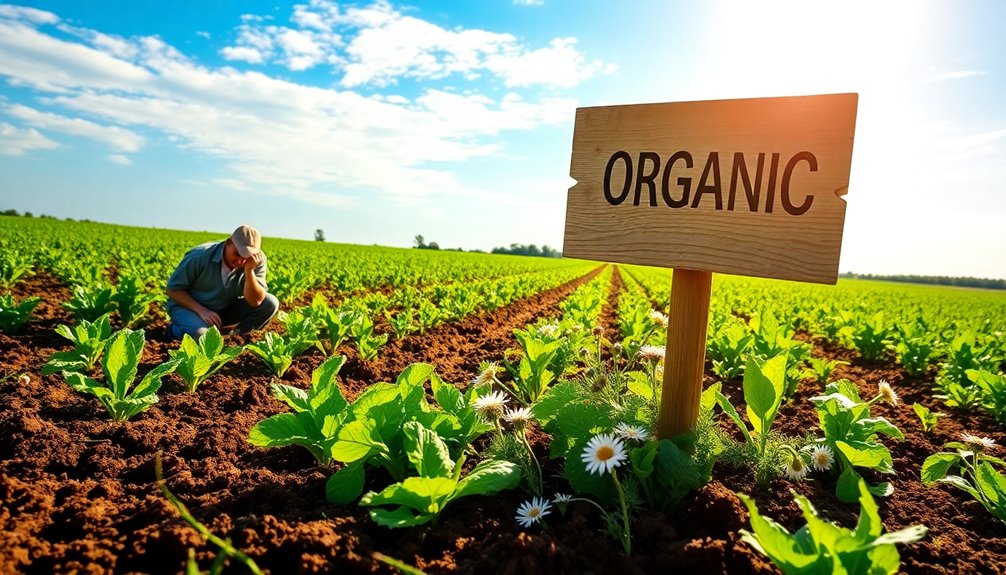
When you immerse yourself in organic farming, you discover a system that prioritizes natural methods over synthetic ones. This approach prohibits synthetic pesticides and fertilizers, fostering ecological balance and promoting sustainable agriculture.
By focusing on soil health through practices like composting and crop rotation, you enhance biodiversity and nutrient cycling, creating a thriving ecosystem. Achieving organic certification guarantees compliance with stringent standards set by the USDA, reflecting a commitment to chemical-free agriculture.
As you explore the global landscape of organic farming, which spans approximately 70 million hectares, you'll recognize its environmental benefits, such as reduced pollution and improved soil conservation.
Ultimately, organic farming isn't just a method; it's a movement toward healthier, more sustainable food production.
Key Practices in Organic Agriculture
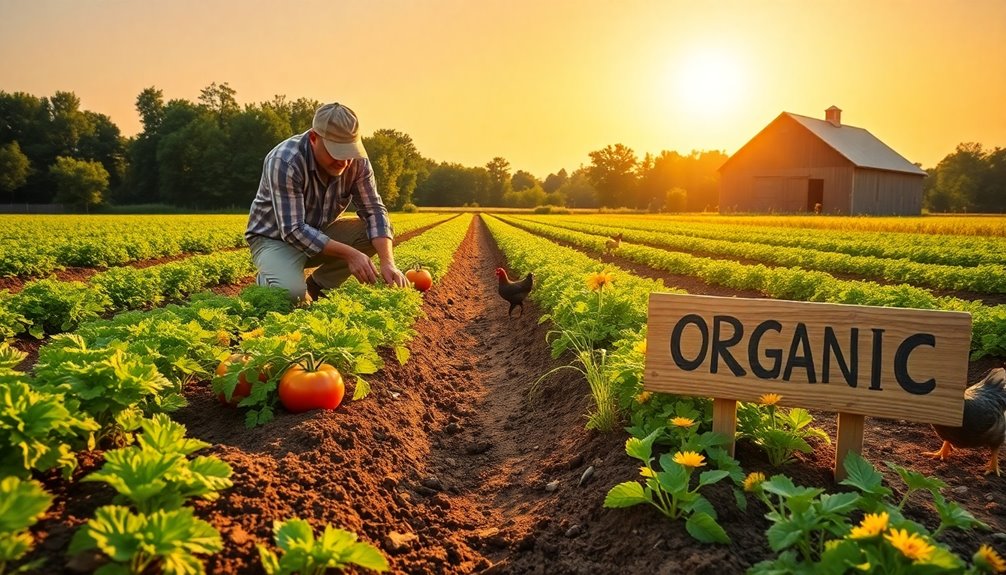
In organic agriculture, you'll find key practices that focus on sustainability and ecological balance.
Crop diversification techniques boost soil health, while natural pest control methods eliminate the need for synthetic chemicals.
Understanding these practices can help you create a thriving farm ecosystem.
Crop Diversification Techniques
Crop diversification techniques are essential for creating resilient organic farming systems, as they involve planting a variety of crops in a single area to boost soil health and enhance biodiversity.
By employing crop diversification, you can effectively break the cycle of pests and disease associated with monoculture. Different crops disrupt harmful organisms' life cycles while promoting beneficial organisms.
As an organic farmer, you might implement crop rotation to replenish soil nutrients, improve soil structure, and minimize weed growth. Additionally, incorporating cover crops can prevent soil erosion and enhance fertility, creating a healthier environment.
Soil Health Management
Soil health management is essential for successful organic farming, and it involves several key practices that enhance soil fertility and structure.
By prioritizing these organic farming practices, you can create a thriving ecosystem.
- Experience increased crop yields and resilience to environmental stresses.
- Support biodiversity, which benefits both your farm and the planet.
- Enjoy healthier plants nourished by rich organic matter.
Incorporating composting enriches your soil with crucial nutrients and fosters microbial activity.
Utilizing nitrogen-fixing legumes in crop rotations naturally boosts soil nitrogen levels, while green manure enhances organic matter.
Crop rotation prevents nutrient depletion and disrupts pest cycles, ensuring your soil remains fertile.
Natural Pest Control Methods
Creating a thriving ecosystem on your organic farm also means managing pests without synthetic chemicals.
Natural pest control methods like biological pest control introduce beneficial insects, such as ladybugs and predatory wasps, to keep pest populations in check. You can also use natural repellents, including essential oils from herbs, to deter pests.
Implementing crop rotation disrupts pest life cycles, reducing their chances of building up in your fields. Integrated Pest Management (IPM) combines cultural, mechanical, and biological approaches, maintaining ecological balance while minimizing synthetic pesticides.
Organic standards allow you to use naturally occurring substances like neem oil and diatomaceous earth, ensuring your pest management practices adhere to chemical-free agriculture principles. Additionally, understanding natural signs can help predict pest outbreaks and inform your pest management strategies.
Embrace these methods for a healthier farm and environment.
Benefits of Organic Farming
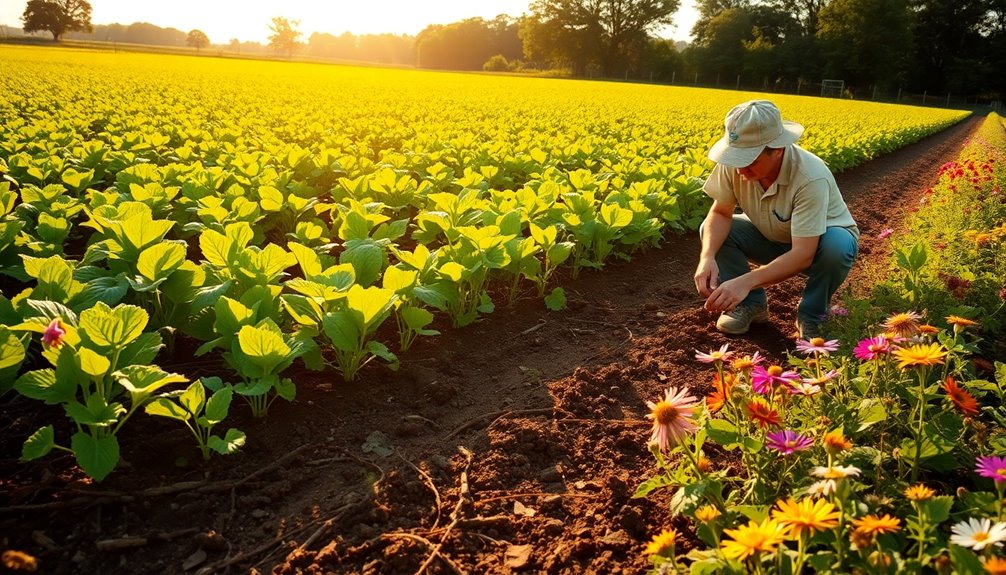
One of the significant benefits of organic farming is that it produces food free from harmful chemical residues, giving you healthier options packed with essential vitamins, minerals, and antioxidants.
By choosing organic foods, you're not just improving your health; you're also supporting sustainable practices that enhance soil fertility through natural methods like composting and crop rotation.
- Enjoy the peace of mind knowing your food is free from synthetic pesticides.
- Support biodiversity and the environment by choosing sustainable farming.
- Contribute to the growing consumer demand for healthier, eco-friendly options.
Organic farming reduces environmental impacts, protects wildlife, and maintains ecological balance through effective pest control methods.
Make the switch for your health and the planet's future!
The Role of Certification
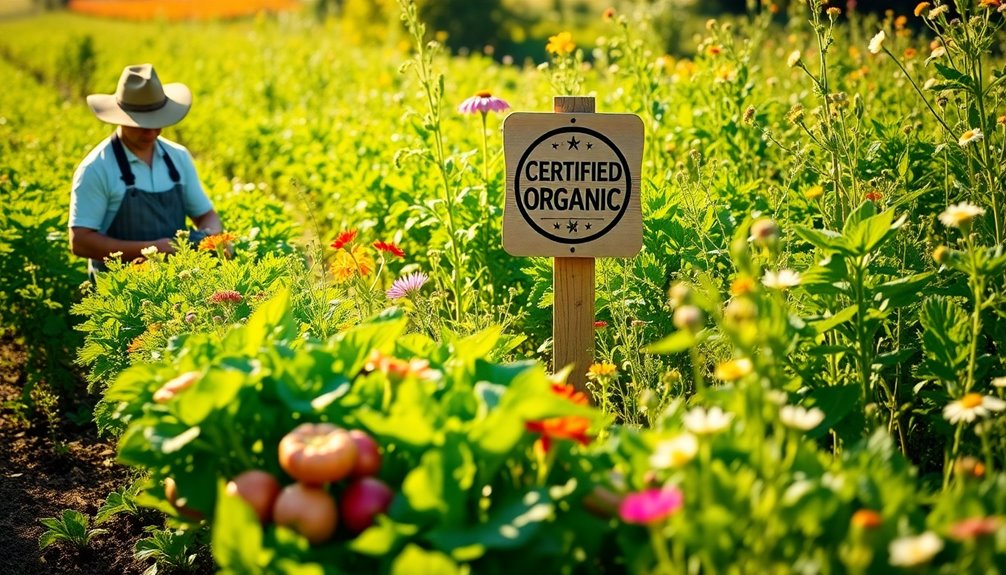
Certification plays an essential role in guaranteeing that your organic food truly meets the standards you expect. Organic certification verifies that agricultural products are free from synthetic fertilizers and pesticides, adhering to strict standards set by regulatory bodies like the USDA.
To achieve certified organic status, farmers must commit to sustainable methods for at least three years, undergoing regular inspections to confirm compliance and transparency. This process builds trust in the organic label, vital for meeting increasing consumer demand.
As more people recognize the benefits of chemical-free produce, certified organic products often command premium pricing in the market, reflecting their perceived health and environmental advantages. Embracing certification not only supports your health but also promotes sustainable agriculture.
Economic Impact of Organic Produce
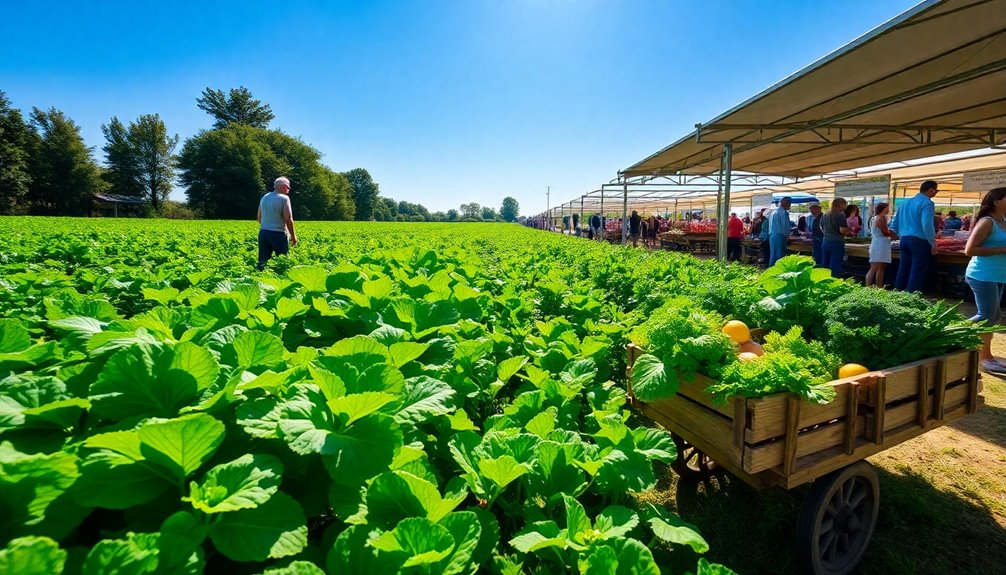
You've likely noticed the rapid growth of the organic food market, which reached a staggering $150 billion in 2022.
As consumer demand continues to rise, producers are seeing profit margins soar, with organic products often priced up to 30% higher than their conventional counterparts.
This trend not only benefits farmers but also contributes to a more sustainable economy overall.
Market Growth Trends
How has the organic food market evolved in recent years? The global organic food market surged to around $150 billion in 2022, fueled by rising consumer demand for healthier, chemical-free agriculture.
With a remarkable 26.6% increase in organic farmland from 2021 to 2022, more farmers are embracing sustainable practices. Although organic products represent only 2% of total food sales in North America and Europe, their market growth is undeniable.
- Consumers crave transparency in their food sources.
- Farmers enjoy premium pricing for their organic produce.
- Government incentives encourage a shift toward organic farming.
This trend reflects a significant economic impact, as agricultural practices evolve to meet the increasing demand for organic products and promote sustainable futures.
Profit Margins Analysis
Organic farmers often enjoy notably higher profit margins compared to their conventional counterparts, primarily due to the premium pricing of organic produce. Organic products typically sell for 20-50% more, reflecting the increasing consumer demand for health and sustainability.
Although certification costs can average around $750, government incentives can help offset these expenses. Additionally, sustainable practices in organic farming improve soil health and crop resilience, leading to higher yields over time.
With the global organic food market reaching approximately $150 billion in 2022 and an annual growth rate of around 10%, the economic opportunities for organic farmers are expanding. This combination of factors notably enhances profit margins, making organic farming a lucrative venture.
Consumer Demand Influence
The economic advantages of organic farming are closely tied to the rising consumer demand for organic produce. With the organic food market reaching $150 billion in 2022, it's clear that people crave healthier, chemical-free options. This demand drives market growth, as nearly 90% of American consumers buy or consider organic products.
They're willing to pay premium prices, often 20-50% more than conventional agriculture, for the perceived health benefits.
- You're supporting sustainable farming practices.
- You're investing in your health and well-being.
- You're contributing to a cleaner environment.
Government agricultural initiatives further enhance these opportunities for farmers, encouraging them to shift to organic practices and meet this growing consumer demand effectively.
Addressing Common Misconceptions
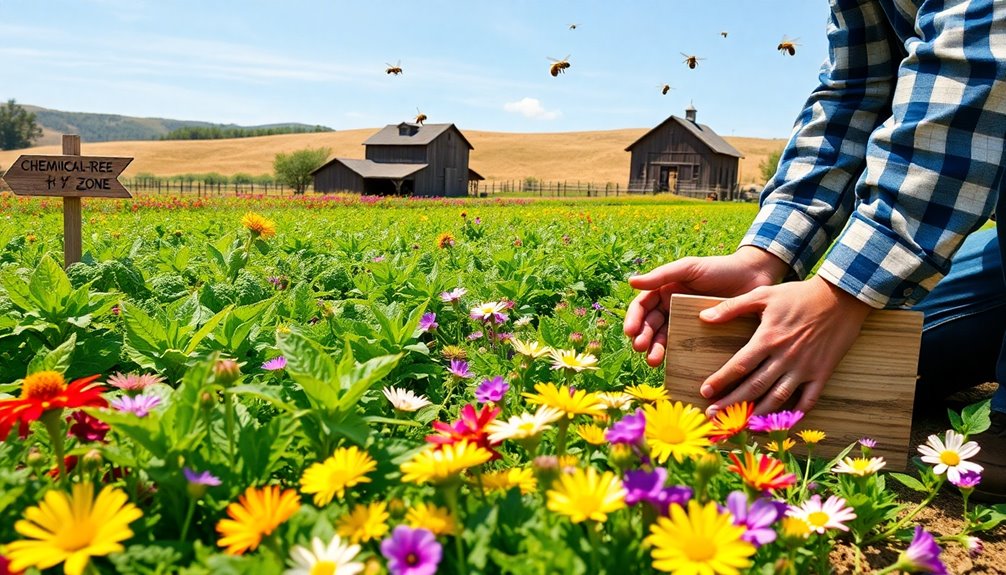
Despite popular belief, organic farming isn't synonymous with being entirely chemical-free. Organic standards allow for naturally derived substances, while prohibiting harmful synthetic chemicals like glyphosate.
Many consumer misconceptions suggest that organic farming methods are less productive than conventional farming, but research shows that when managed properly, organic farms can yield comparable results, especially in biodiverse areas.
Some think organic food is always healthier; while it often has lower pesticide residues, its nutritional content can vary. Additionally, not all organic products are locally sourced, so checking labels is essential.
Finally, while organic goods may cost more due to sustainable practices, rising demand and government support are making them increasingly accessible to consumers.
Frequently Asked Questions
What Is Meant by Organic Farming?
Organic farming means growing food using natural methods, without synthetic chemicals or genetically modified organisms.
You focus on enhancing soil health and promoting biodiversity through practices like crop rotation and composting.
By avoiding harmful pesticides and fertilizers, you're not just supporting your health but also the environment.
This approach nurtures a sustainable ecosystem, allowing you to enjoy fresh, chemical-free produce while contributing to a healthier planet for future generations.
What Does Sustainable Organic Farming Mean What Is the Secret to It?
Imagine you're managing a farm where you rotate crops to enhance soil health.
Sustainable organic farming means you're using practices that boost biodiversity while avoiding synthetic chemicals. You might apply natural fertilizers and biological pest control instead of pesticides.
The secret lies in maintaining ecosystem balance, producing healthier food, and supporting local economies.
What Is the Biggest Problem for Organic Farmers?
The biggest problem you'll face as an organic farmer is maintaining soil fertility without synthetic fertilizers. This challenge can lead to lower crop yields, impacting your overall productivity.
You might also find production costs are higher due to organic inputs and certification fees. Additionally, pest management relies on natural methods, which can be less effective, leaving your crops vulnerable.
Market fluctuations can further complicate things, affecting the economic viability of your organic practices.
Is Organic Food Really Chemical Free?
You might think organic food is completely chemical-free, but that's a bit of a misconception.
While organic farming avoids synthetic fertilizers and pesticides, it doesn't mean there aren't any chemicals involved. Naturally occurring substances and approved organic pesticides can still be used, and cross-contamination can occur.
Overall, organic produce typically has lower pesticide residues than conventional options, making it a healthier choice for many.
Conclusion
In a world painted with vibrant crops swaying gently in the breeze, you've discovered the beauty of organic farming. You're not just nurturing plants; you're cultivating a healthier planet for future generations. Each chemical-free bite of produce bursts with flavor and nutrients, echoing the care you've put into the earth. By embracing these practices, you're revealing a treasure trove of benefits, transforming your garden into a sanctuary of sustainability and wellness. Together, let's grow a greener tomorrow!

